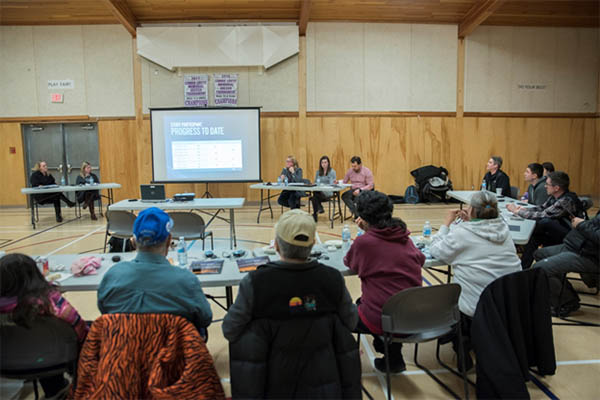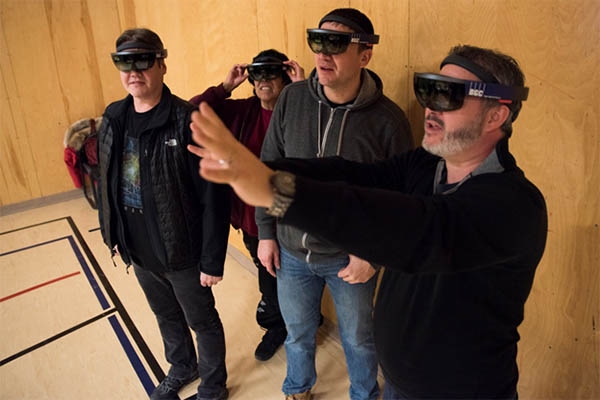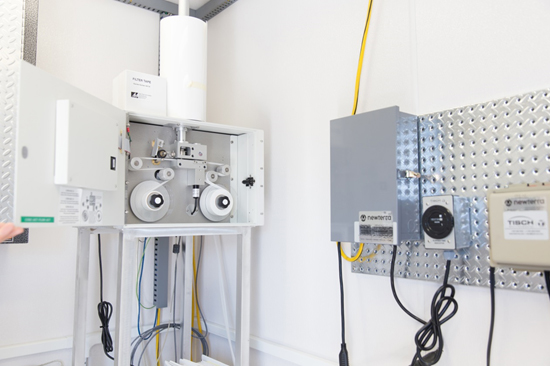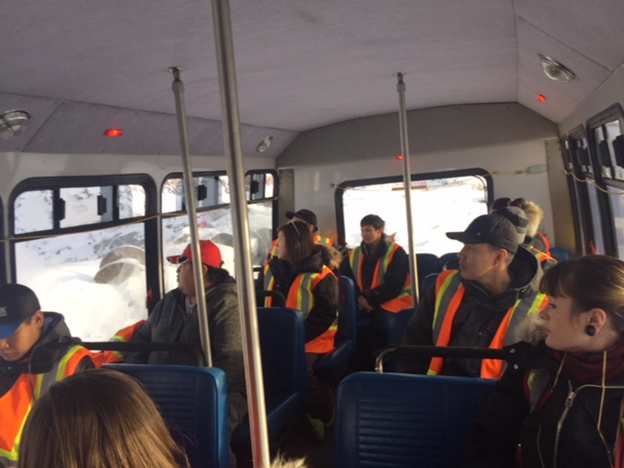Spring 2018: What's Happening at Giant?
Get the most recent updates on the Giant Mine remediation project.
Table of contents
Community Forums
The Giant Mine Remediation Project team thanks everyone who came out to our annual forums in Yellowknife and Ndılo this year. Forums were co-hosted by the North Slave Métis Alliance in Kam Lake on March 6, and at the Ndılo Gym by the Yellowknives Dene First Nation on March 7, followed by a public session at the Prince of Wales Northern Heritage Centre in Yellowknife on March 8.
These forums provide project updates, reporting on site stabilization work and presenting the draft Closure and Reclamation Plan. This Plan will form a significant part of Project discussions this year, as the team works toward finalizing the water licence application and moving forward on remediating the site.


Main Construction Manager team update
At the community forums, the Project team was pleased to introduce the Main Construction Manager team from Parsons Inc. This core team will be responsible for issuing contracts for work on the site as the Project moves toward implementation.
Parsons Inc. was awarded the Main Construction Manager contract on December 14, 2017; however, this is not the first time Parsons has been involved in the Giant Mine Remediation Project. They were previously involved in the successful deconstruction of the Roaster complex between 2012 and 2014, and have been the Interim Construction Manager for the site since 2015.
Parsons Inc. will assume the role of site Mine Manager in summer 2018. They will be responsible for maintaining the site until the completion of remediation activities.
Parsons plans to post and award several service contracts that will incorporate criteria into each tender that will encourage bidders to maximize the use of Indigenous and local resources. This includes the use of tools such as Aboriginal Opportunity Considerations (AOC), as procurement evaluation criteria (where bidders must outline and meet targets for how they will maximize local and Indigenous contracting, training and employment) on the project, as well as the Procurement Strategy for Aboriginal Business (PSAB). This procurement approach has successfully worked to maximize Northern and Indigenous employment, training and business opportunities for the Giant Mine Remediation Project in previous contracting processes. For example, of approximately $356 million in contracts that were awarded to date, approximately $169 million were awarded to Indigenous businesses..
The tenders being posted by Parsons will be on Merx (Private Construction) so companies may submit bids directly to Parsons Inc. Parsons will also develop a website to provide interested parties with information about upcoming work. Once this is live the Project team will make it available in this newsletter.
In the meantime, Louie Azzolini, Community Economic Development Manager, of Yellowknife, and Lisa Colas, Community Liaison, of Ndılo are the main contacts in Yellowknife for Parsons Inc. For more information, contact Mr. Azzolini at 867-688-0655 or louie.azzolini@parsons.com.
The Giant Mine Remediation Project team continues to strive to maximize the benefits to Northern and Indigenous groups and businesses. This includes working with various community organizations to support and build capacity in the North, such as access to relevant training and employment opportunities. The Project team will continue to update the public as to upcoming actions arising from the Project's socio-economic strategy, developed to ensure Northerners and Indigenous persons are positioned to benefit from employment opportunities that result from the remediation of the Giant Mine site.
Procurement Updates
The Giant Mine Remediation Project team, via the Interim Construction Manager, has recently awarded a number of work packages. These included:
- UBC Bridge Repair to Rowe's Construction ( December 2017)
- Underground Pumping Upgrades – Electrical Supply to Purcee Industrial Controls Ltd. (December 2017)
- Underground Pumping Upgrades – Pump Supply to Denesoline Ryfan Ltd. (January 2018)
- Underground Pumping Upgrades – Well Drilling was awarded to Nahanni Construction (December 2017)
In addition, the C5-09 Stope Stabilization contract was awarded to Nahanni Construction. This entails backfilling the last remaining stope complex as part of the underground component of the site stabilization plan. This contract was awarded in February 2018.
Draft Closure and Reclamation Plan
The Closure and Reclamation Plan for the Giant Mine site is the culmination of the engagement and design work the team has been working on since the Report of Environmental Assessment. The Project team is currently working to issue the draft Closure and Reclamation Plan in June, with community engagement sessions to follow during the summer.
Given the size of the document, the team is working to set up a sharing platform that will allow interested members of the public to easily access these files. If you would like to have access to this sharing platform, please email giantmine@aandc.gc.ca so the team can make sure you are set up in advance.
A number of engagement activities associated with other aspects of the Project will continue throughout the year. In addition, a Qualitative Risk Assessment session with the Giant Mine Working Group is being planned for May. The Project team is also working to schedule a stress study session. The Project team will continue to share information about upcoming public sessions through this newsletter.
Health Effects Monitoring Program Update
The Health Effects Monitoring Program, which determines current level of arsenic exposure in residents, has completed its first sampling period. A total of 898 people from Yellowknife, Ndılo, and Dettah have participated to date. Participants are expected to receive their results in a personal letter starting in September 2018. The next round of sampling began in April 2018. The research team expects to send letters to randomly-selected participants shortly. Anyone who has lived in Yellowknife, Ndılo, or Dettah for the past 12 months is eligible to participate in this study, if they are between 3 and 79 years of age, or, are an Elder. If you received a letter inviting you to participate, we encourage you to contact the research team.
For more information, please visit Health Effects Monitoring Program.
Giant Mine Oversight Board Grant Authority
The Giant Mine Remediation Project has now established the grant authority for the Giant Mine Oversight Board. This not only meets the commitment in the Environmental Agreement, it also addresses the Board's recommendation in their 2016 Annual Report.
Air Quality Monitoring

The fenceline stations at the Giant Mine site are up and operating early this year as a result of activities occurring on site. The fenceline air quality monitoring stations for the Giant Mine site are usually shut down over the course of winter, when snow cover prevents dust from leaving the site. To see real-time data and access weekly reports, please visit the NWT Air Quality Monitoring Network website.
BEAHR Students Tour Giant Mine Site

The Giant Mine Remediation Project team regularly looks at ways to engage the community, strengthen relationships, and support training activities to maximize socio-economic opportunities that will result from the clean-up of the Giant Mine Site. On February 8, 2018, the Project gave students participating in the BEAHR Eco-Remediation training through the Yellowknives Dene First Nation (YKDFN) an up-close look at work opportunities they might be interested in pursuing as remediation efforts go forward.
At the request of the YKDFN Training Program Coordinator, Geneva Irwin and Erika Nyysonnen, representing the Project team, provided a presentation on the draft Closure and Reclamation Plan. This included viewing drone footage of the site provided by the Giant Mine Oversight Board. The presentation was followed by a surface tour to give context to the presentation. This allowed students to get a better understanding of care and maintenance of the site, as well as the many aspects that will be part of the full remediation. The Project team looks forward to continuing this relationship with the Yellowknives Dene First Nation's BEAHR training program, and hopes this and similar training programs will continue to foster interest in pursuing work in the remediation field for northern and Indigenous workers.